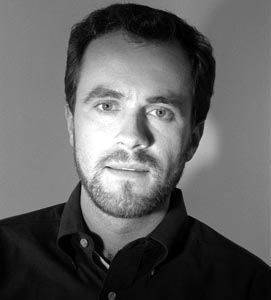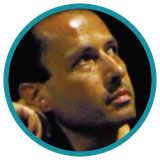
Entrepreneurship and UFOs
Late on night in October 1997, just for the heck of it, Joe Firmage decided to go web surfing. As the CEO of a major Silicon Valley start-up, USWeb, Firmage didn’t have a lot of leisure time. But he had studied physics as an undergrad at the University of Utah, and wanted to brush up on some of the latest findings. So he plugged in a few searches, and soon came across a report by a Lockheed-Martin scientist asserting that inertia, the Newtonian force that makes your tennis balls sail, was an electromagnetic side effect of something called the zero point field. To him, the article suggested a new method of space propulsion — a way of conquering gravity without rockets — and Firmage, who was fascinated by all things extraterrestrial, was intrigued. Very intrigued.
But Firmage, then 26 years old, couldn’t concentrate on the article with everything else pressing down on him. He had been in Silicon Valley for two years, and USWeb, which he founded with his partner Toby Corey, was already hitting the big time. An Internet consulting firm that was launching monster companies like Harley-Davidson and Levi’s into cyberspace, USWeb had snatched up scores of Web development shops on its way to becoming a billion-dollar operation. That night, frazzled from preparing USWeb for its I.P.O., Firmage downloaded the article to read later and went to bed.
The next morning at his home in Los Gatos, his alarm buzzed at 6. But instead of getting up to go to the gym, Firmage rolled over and hit the snooze button. As he lay there half-slumbering, an image appeared over his bed, a bearded gentleman with a dark brown head of hair.
“Why have you called me here?” the being asked, clearly irritated.
“I want to travel in space,” answered the astonished Firmage, who spoke without a moment’s deliberation, as if in a dream.
The fellow remained nonplussed. “Why should you be granted the opportunity?”
“Because I’m willing to die for it!”
Then, says Firmage, the man produced a sphere, an electric blue ball about the size of a cantaloupe, which entered Firmage’s body, taking command of his muscles and producing unimaginable waves of uber-orgasmic ecstasy.
As you might expect, Firmage greeted the day feeling rather light on his feet. Which was a good thing, because the Asian currency crisis was unfolding just as USWeb’s pre-IPO road show was set to begin. But Firmage came through with flying colors — USWeb raised $50 million — all the while secretly nursing memories of his baffling encounter. “Anybody you’d talk to prior to this whole escapade would describe me as about the most rigorously logical, analytic type you could possible meet,” he says. “So for me this was a particularly profound experience, because it was inexplicable.”
Nonetheless, Firmage’s visionary experience did not exactly appear out of thin air. A descendant of Brigham Young, Firmage was raised a Mormon, and grew up hearing tales of the otherworldly humans who led the young Joseph Smith to the golden plates he translated into the Book of Mormon. And though Firmage abandoned his faith at age 15, the precociously intelligent boy brought rather religious emotions to his new worldview of science, feelings of cosmic awe that he traces to that defining moment of his generation: Star Wars. But SF wasn’t enough. What really sealed his galactic passions was Carl Sagan’s Cosmos series. “It was beautiful and it was science, and therefore it was real, far more real than religion to me.”
Driven by his enthusiasm for all things cosmic, Firmage continued to investigate zero-point-energy following his otherworldly encounter. Zero point energy, or ZPE, is the term some physicists use to describe the enormous store of quantum energy that fills even the smallest and most empty regions of space. Given its enormous potential energy and quasi-mystical character, ZPE has also become a flash point for all sorts of fringe scientists, free energy researchers, New Age physicists, and maverick inventors. As Firmage used the Internet to absorb findings and build contacts in the ZPE world, he came to believe that human civilization was on the verge of radical technological discoveries, breakthroughs that would enable us to replace fossil fuels and to fly to Alpha Centauri at the drop of a hat.
As he researched ZPE, Firmage also heard the siren song of the extraterrestrial. Having scarfed up flying saucer books as a teen, Firmage delved once again into the house of mirrors that surrounds the UFO, chasing whatever elusive truths snake through that labyrinth of vision and hoax, conspiracy and anomaly, science and psyche. Having already used the net to build connections with physicists and researchers exploring ZPE, Firmage wound up making a more esoteric range of contacts, including, he claims, top military and scientific leaders. These people proceeded to convince Firmage that UFOs were absolutely real, and that the government has kept the knowledge under wraps since the fabled Roswell crash of the 1940s.
Like many buffs, Firmage found himself longing for the day when this dense fog of official lies and obfuscations would finally dissolve in the light of alien truth. In a rather messianic twist of the tale, Firmage came to believe that he, Joe Firmage — brainiac wiz-kid, triumphant CEO, digital darling — was the man to tip the scales. And so Firmage decided to write a book, or rather, he gathered fifteen anonymous “experts” to write a book along with him, nondisclosure agreements and all. With foolish and naive courage, Firmage went public with his beliefs late last November, promoting and Web-publishing, at considerable expense, a 600-page tome called, unbelievably, The Truth. And once the Truth got out, Joe Firmage’s silicon success story came tumbling down.
The shit hit the fan even before The Truth launched. The day after Firmage put his name on one of the pre-publication teaser pages for the book, a call came in to Mark Kvamme, the CEO of CKS, a slick Silicon Valley ad agency that USWeb had merged with just that fall. “Boy I am going to enjoy competing with you now that your CEO is becoming the next L. Ron Hubbard,” gloated the rival. Soon panicked investors started ringing up. Wryly, Firmage notes that these calls came in before anyone knew that his book concerned UFOs — it was simply the religious undertones of his teaser site that got folks riled up.
Within a week, Firmage voluntarily stepped down from his corporate position — though he admits that if hadn’t gone willingly, he would have gotten the boot. He retained the title of head of strategic planning, but when his ET research hit the press, even that largely symbolic post became a thorn in the side of USWeb/CKS. Wall Street thought he was nuts, and the headlines didn’t help: “From IPOs to UFOs,” “The Ex-CEO Files,” or “The Truth is Out There — And Joe Firmage is Paying For It.” Nor could people keep a straight face when confronted with Firmage’s suggestion in a Silicon Valley paper that some of the tech that put the Valley on the map was reverse-engineered from crashed Roswell saucers — a process Firmage compares to a bunch of chimps getting their hands on a Palm Pilot. It was all getting to be too much. In January, he simply resigned from the firm. For all the “visionaries” and “gurus” it claims to harbor, Silicon Valley still answers to the bottom line, and the bottom line these days does not include room for alien hieroglyphs — at least when you step outside of Hollywood.
Having helped turn the Internet into a major vehicle for corporate presence, Firmage became its victim as well. After all, Firmage made his silicon millions from the very same medium that sucked him into the UFO paradigm. “I can assure you of one thing,” Firmage tells me. “We would not be having this conversation today if it weren’t for the Internet. Without it I would not have been able to cross critical mass in my own knowledge.” By its very nature, the Net dissolves the formal distinction between truth and image, center and margin, rumor and news. The Web is a kind of conspiracy-machine, a mechanism that encourages speculative leaps and dream-like links between tons of datafiles, linkages that in turn make whatever phenomenon you are investigating seem substantial. Just tap “zero point energy” into your favorite search engine, and you too can slip into a strange world of tantalizing theories and amazing claims that would require years of your average layman’s brain to properly assess.
For Firmage, the Net is also a kind of harbinger of the sorts of technologies that he believes are just around the corner: revolutionary mechanisms that will fundamentally change the economy, culture, even consciousness itself. “In my opinion it is no accident that society develops an Internet before the types of things that I am talking about could ever become realized,” he says. “From my perspective, the Internet is very literally the mind of humanity, in every way you would call something a mind.”
***
Firmage still holds onto his USWeb office, which lies at the end of a long corridor near the desk his assistant is forced to rent from the company. The shades are drawn against the bleached Santa Clara light, and his desk is a jumble of NASA videotapes, financial grimoires, and copies of the Journal of Religion and Psychical Research. There are boxes piled on the floor, giving the room the unsettled feel of a house whose occupants are half-heartedly preparing for a move they don’t really want to make.
The man himself is slight but handsome, with sharp blue eyes and a close-cropped reddish beard, and he seems wound as tight as a spring. The moment he begins to speak, it becomes instantly evident that Joe Firmage is not some brain-baked abductee, or straw-chewing hick mumbling about funny lights over the corn field. He is an astonishingly bright and articulate man, who enunciates crisply and treats every conversation as if it were a debate between gentlemen. “I assert to you,” he’ll say, before his razor-sharp mind starts pursuing some curiously logical proof of alien contact.
Of course, Joe Firmage is hardly alone in his interest in things extraterrestrial these days. Ufology is full of kooks and hustlers, but it is also full of many men who are like him: geeky and deeply sincere left-brain mystics bent on nailing down truths which consistently elude the net of reason. But Ufology is only the tip of the extraterrestrial iceberg. Between alien rave logos, X-Files reruns, and Men in Black cartoons, aliens have achieved a pop presence not held since the days of 1950s B-movies or 1970s saucer cults. Alien abductees now run neck-and-neck with Satanic abuse victims in the race for most outlandish psychological pathology, and even Harvard Medical School psychiatrists like John Mack are taking their claims seriously. Many hard-headed scientists who loathe UFO buffs are also increasingly open to the notion that intelligent life exists elsewhere in the cosmos. UC Berkeley recently announced the establishment of the university’s first chair for the Search for Extraterrestrial Intelligence, and the recent discovery of a planetary system surrounding Upsilon Andromedae, a nearby star similar to our sun, only bolsters the hunch that there are parallel earths out there. “The idea we are alone in the universe is absurd,” says Michael White, British author of the forthcoming Life Out There and a biographer of Stephen Hawking and Isaac Newton. “Our galaxy and our neighborhood star systems are teeming with life of all sorts and at all levels of advancement.”
This is an exciting idea for a lot of folks, especially folks in Silicon Valley. The massive signal processing effort known as SETI (the Search for Extraterrestrial Intelligence), which uses arrays of radio-transmitters to scan the skies for intelligent bleeps, is headquartered in the Valley, and receives much of its dough from Intel co-founder Gordon Moore and Microsoft gazillionaire Paul Allen. Though Firmage went deeper into the heart of weirdness than most, his journey can hardly be considered anomalous in a place full of technological futurists, freethinking nerds, and hardcore science-fiction fans.
Nor is Firmage your average UFO buff. Unlike a lot of folks, whose idea of the big picture amounts to a 72-inch TV, Firmage thinks on a grand scale. As he makes clear in The Truth, which wends its way through a morass of theology, politics, physics, and natural history before it even gets to the Roswell goods, Firmage believes that the ETs only make sense when you see them against a larger backdrop, which Firmage also calls the Kairos moment. “We are at a point of history where we are on the cusp of the grandest possible discoveries of human history,” he says. “Five thousand years ago most of us were living in caves and huts, today our spacecraft are leaving the solar system. There is an undeniable trajectory there. Modern science seems to have its head in the sand believing, like every generation before it, that that trajectory somehow stops at the end of the second millennium.”
Firmage’s own trajectory blasts full speed ahead, into the potent vacuum of space. He believes we are on the cusp of learning how to tap the ZPE from the quantum vacuum, a cup of which has enough energy to boil the oceans of the earth. As you might expect, this opinion is not universally held among modern physicists. Even if you grant the possibility of exploiting zero point energy — a notion that already sends the eyebrows of most physicists to the roof — you still have to build the damn thing. “There are plenty of physically possible mechanisms that are practically impossible,” explains Andrew Jaffe, a Researcher at the Center for Particle Astrophysics at UC Berkeley. “And there are many more mechanisms that are impossible today but likely to be much simpler than dealing with vacuum energy!”
Such sentiments do not deter Joe Firmage, because he is the sort of man who can frankly utter statements like “modern physics is full of shit.” According to The Truth, the ZPE breakthrough will happen soon, and will provide us with an essentially free source of energy that will eradicate our toxic addiction to fossil fuels. Firmage’s book also argues that with ZPE in hand, we will be just a hop, skip, and a jump away from engineering gravity. In other words, warp drive, on demand.
In Firmage’s mind, the feasibility of gravity propulsion devices destroys the only convincing scientific argument against UFOs (the lack of physical evidence doesn’t seem to bother him). Moreover, our own imminent ZPE breakthrough also explains what all these alien tricksters are doing here in the first place. “If the child beings to climb out of the crib, parents get interested,” Firmage says. “Its just like Star Trek: First Contact. You see a warp signature, and you know that the children have climbed out of the crib.”
To his credit, Firmage does not claim to have a bead on the exact origins, identify, or purpose of the extraterrestrials, but he does know one thing: some of them wear white hats. At a time when many abductees report horrible little almond-eyed Dr. Mengeles armed with anal probes, Firmage has resurrected the Space Brothers optimism of the 1950s. Firmage believes that the aliens in our midst are teachers, here to help us strap on the psychological shoes that we’ll need for our birth as galactic citizens. He even holds that the founding myths of world religions were created by these teachers in order to seed human culture with the ethical memes we’ll need for our ultimate graduation into space. For proof, Firmage suggests rereading the New Testament, replacing the words heaven with space, and angel with teacher. “The book ceases to have the mythical quality and it begins to have anthropological sensibility. It begins to say to you, ah, this is how you take a chimpanzee and turn him into a space traveler.”
By plugging spirituality into a galactic framework, Firmage hopes to keep the ethical and mystical core of religion alive in a world ruled by naturalism. It his own fantastic attempt to heal the rift between science and religion, a rift that he believes must be sutured if we are to avert the environmental catastrophes that loom all about us. Indeed, the most moving and convincing passages of The Truth bristle with Firmage’s informed passion for the physical world, and his perfectly reasonable pessimism about the present course of things. As Firmage puts it, “Y2K is a gnat compared to the seriousness of the damage we are inflicting on the biosphere.”
Firmage’s ultimate faith is not that the aliens will save us, but that the stone-cold truth about their existence will trigger a massive transformation of human culture. “It will indelibly mark in the consciousness of an entire species that the cosmos is coherent, that the majestic and sweeping history of human art and science, of war and peace, had a point, and the point was to build sufficient coherence that a birth was possible, the birth of a species into space.” Firmage’s ZPE hypothesis is thus a species of technological apocalypse, if we remember that apocalypse does not mean fire and brimstone but revelation. “People will instantly and viscerally understand that there is a far grander scheme, that they are part of a Star Wars script. Then they will start to behave in ways that naturally tend to self-organize a new type of vision.”
If the flying saucers of the late 1940s and 1950s were manifestations of nuclear anxiety, our current crop may be tied to the more pervasive if ill-defined sense that we are making mincemeat of our lonely orb. In his forthcoming book, Passport to the Cosmos, the Harvard Medical School psychiatrist John Mack writes that one of the central themes of the alien encounters he studies is the conviction that Gaia is on the brink. Mack has worked with over 200 abductees, whose experiences tend to be far more freaky than Firmage’s bedside chat, and he is convinced that we cannot explain the phenomenon within our conventional categories of reality. “There is some kind of intelligence that we are connecting with,” Mack told me from his Cambridge home. “It’s not simply the imagination of people.” This intelligence seems particularly obsessed with the ecological crisis, as if it were a cosmic feedback loop that kicks in as the world decays, breaking through our scientific materialism in the only way it knows how: waking dreams, persistent myth, and supernatural anomaly. ETs are the new elemental heralds, the elves and leprechauns of a globalized and dying forest. And while encounters with these critters are often traumatic, Mack insists they can be transformative as well. “This experience shatters people’s constricted worldviews, which can then connect them to a larger reality. It opens their pores to the divine, to home, to source, to what we once called God.”
Firmage has certainly had his pores pried open, and is willing to weather the slings and arrows of outraged commentators because he thinks he’ll get a ringside seat at the glorious eschaton ahead. But for the moment, the truth has yet to materialize outside his website, and so Joe Firmage carries on. He is hunting down offices for his International Space Sciences Organization, which will quietly fund research efforts and his own proselytizing. A glossy, full-color print version of The Truth is in the works, and will hopefully lie under hundreds of thousands of Christmas trees. He’s also finishing up an hour-long film that he plans to take on a 20-city speaking tour, a spectacular History of The World According to Joe, brought to life by the Bay Area’s best, and most expensive, computer graphics artists. Firmage has also become something of a star in the UFO community, a martyr for the cause who has used his authority to chat up millions on the Art Bell show and to launch public attacks on Richard “face on Mars” Hoagland, one of Ufology’s reigning charlatans.
But for all his messianic fervor, Firmage is too smart to ignore the possibility that he’s backed the wrong horse. “But whether I am right or wrong, I think that this will serve a valuable function for society. If I am wrong, it will be the most clear case yet with which to tear down the fiction of this whole domain. If it has infected someone as promising as me, then it should be taken down.” After all, The Truth did not catalyze any of the official announcements that Firmage expected, and he admits that if nothing happens he will be extremely disappointed. “I genuinely feel like I’ve leaped off the cliff, and I hope that there’s a parachute when I pull the ripcord.”




